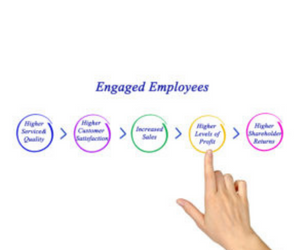Your Family Businesses Is Both Socialist and Capitalist: Take Advantage of this!
The relationships in family businesses are vastly more complicated than the relationships in a publically-owned business. Cathy Carroll has a brilliant explanation of why this is so, and even better, she has some great approaches for successfully dealing with these complications.
“In a family business,” Carroll begins, “we are operating simultaneously with two seemingly incompatible mindsets. The family mindset expects unconditional love and that family members will be treated with equality. The business mindset expects that rewards will be based on results.”
She goes on to remind us that in the corporate world, promotions and compensation come from performance. Meritocracy and the focus on maximizing shareholder value means that equality of rewards is probably going to go out the window.
A Family Business Combines Socialism and Capitalism
Carroll has an interesting approach to making sense of these two mindsets. “The family part of a family business resembles socialism, with its expectations of belonging, fairness and equality. The business side of the family business resembles capitalism, with its focus on competition, meritocracy and profits.”
Carroll emphasizes that the blend of socialism and capitalism makes for some stormy waters when it comes to the relationships within the family business.
How can family businesses navigate these troubled waters?
A Case Study
One of Carroll’s favorite clients came to her recently, saying “Cathy, over the course of my career, I’ve started and sold eight companies. But this ninth one is driving me crazy! I can’t figure out what’s wrong!”
Carroll was able to see the problem almost immediately. What was different with the ninth company was, his daughter was working in the company.
The client’s lifetime set of leadership skills had led him to setting clear expectations and then holding people accountable. However, the client wasn’t using those skills with his own daughter.
As a father, he supported her unconditionally, convinced she would mature into a future leader of the business. The result was, he failed to set clear standards, and she was regularly taking advantage of him as no regular employee would ever do.
Things were getting progressively worse for him. Compounding everything else, was that when the emotions surrounding love and money become involved, feelings can be so intense that, as Carroll puts it, “Your body releases stress hormones and your cognitive function decreases. Creative problem solving skills simply disappear.”
For him, it was a downward spiral of increasing frustration. The good news is, Carroll was able to help her client discover that the family and the business part of the family business equation were seriously out of balance.
In his case, at least part of his problem was, he was coming from a place of fear. He was so invested in the family part of the business that he was afraid to use the set of business skills that he had developed over a lifetime as a successful businessman.
In Carroll’s view, he was up against a polarity issue: family man versus businessman. But Carroll’s approach wasn’t that his solution should be “either/or” but rather “both/and.”
Focus on the Upsides, But Track the Downsides
She worked with him on leveraging the benefits of both being a father and a businessman. “With polarity thinking, you focus on capturing the upsides of both family and business, while looking out for the early warning signs of the downsides that arise when over-emphasizing one pole to the neglect of the other.”
For Carroll, the two sides are paired, just as inhaling and exhaling are paired. In the case of this client, he discovered that he can set clear standards and hold her to them. It wasn’t easy when she pushed past a limit and he asked her to leave for six weeks without pay. But during her time away, she reflected on her behavior and returned with a new appreciation for her work and for an opportunity to grow.
If you’re a family business leader and you’d like help in dealing with the tug of war between family and business, e-mail Cathy Carroll at Cathy@LegacyOnward.com or visit her website, LegacyOnward.com.
Search Articles
Latest Articles
Ukraine’s Fate and the U.S. Election: A Perspective from the Front Lines
https://foreignpress.org/journalism-resources/ukraines-fate-and-the-us-election-a-perspective-from-the-front-lines Publication –foreignpress.org
New Life for Old Ambulances
https://foreignpress.org/journalism-resources/new-life-for-old-ambulances Publication –foreignpress.org
Prince Mario-Max Schaumburg-Lippe: Orphans International and James Jay Dudley Luce Foundation Celebrate 25 Years of Global Leadership
https://t2conline.com/prince-mario-max-schaumburg-lippe-orphans-international-and-james-jay-dudley-luce-foundation-celebrate-25-years-of-global-leadership Publication –t2conline.com
Mitzi Perdue: I Am An Assassination Attempt Survivor
Mitzi Perdue: I Am An Assassination Attempt Survivor About The PodcastThe newsmaker interviews and the news you need when time is short!
Subscribe to Updates
About Author

Mitzi Perdue is the widow of the poultry magnate, Frank Perdue. She’s the author of How To Make Your Family Business Last and 52 Tips to Combat Human Trafficking. Contact her at www.MitziPerdue.com
All Articles
Be the Person Others Want to Do Business With: Be fair
Be the Person Others Want to Do Business With: Be fairThe Beginnings of the Sheraton Hotel The international Sheraton Hotel Chain grew from an investment of just $1000. My father, his brother, and his college roommate received war bonuses after their military service...
Heart Disease In Women: It’s Different
Heart Disease In Women: It’s DifferentHEART DISEASE IS A WOMAN’S DISEASE In the 1950s, we all thought heart disease was a man’s disease. However, more women are dying of heart disease than men. Also, even though the mortality rates for both men and women are...
Prevent Nightmare House of Horrors: Family Business Quarrel, Part 2
Prevent Nightmare House of Horrors: Family Business Quarrel, Part 2 To prevent a Family Business Quarrel 1. Create a culture emphasizing that family members are part of something bigger than themselves. Being too self-centered is a danger in a family business....
Preventing Nightmare House of Horrors, a Family Quarrel, Part 1
Preventing Nightmare House of Horrors, a Family Quarrel, Part 1Since you’re here reading this, the subject probably hits close to home. If so, you have my entire sympathy. If ever there’s a high stakes situation, it’s the family quarrel in a family business. I’ve had...
Four Things Frank Perdue Did to Encourage Employee Engagement
Four Things Frank Perdue Did to Encourage Employee Engagement Employee engagement is one of the most important – possibly the most important factor in an organization’s success. When I look at how Frank Perdue (my late husband) built his chicken company from a...
Employee Engagement – Gallup Really Knows!
Employee Engagement - Gallup Really Knows!Visit Gallup, the People Who Really Know There are 1.3 billion full-time employees in the world. Give a guess: how many feel enthusiastic about and committed to their work? 1) 13% 2) 30% 3) 82% 4) How the heck could anybody...




